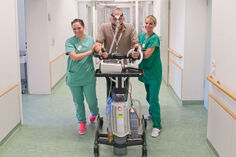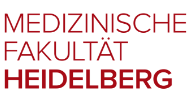Projekte
Eine aktuelle Übersicht über Forschungs-Projekte und die entstandenen Veröffentlichungen, an denen die Thoraxklinik mit Proben und/oder Daten beteiligt ist, finden Sie auf der Homepage des Deutschen Zentrums für Lungenforschung unter der DZL Site TLRC
A current overview of research projects and publications Thoraxklinik is involved with samples and/or data can be found on the homepage of the German Center for Lung Research at the DZL site TLRC:
https://dzl.de/patienten/proben-und-datenverwendung/
Translational Research Center Heidelberg
Lung cancer is a high incidence and high mortality disease. The two main lung cancer types are small-cell-lung carcinoma (SCLC; 20-30% of cases) and non-small cell lung carcinoma (NSCLC; 70-80% of cases). Patients presenting with SCLC have a particularly poor prognosis, and almost 40 % of NSCLC-patients present with metastases at time of diagnosis. Surgery, radiation, chemotherapy, and on a limited scale, targeted treatments - alone or in combination - are used to treat lung cancer. Limited knowledge of which individual molecular markers impact the propagation and spread of the disease impedes the development and use of targeted therapies; hence the treatment success is very variable. Our research focuses on the identification of relevant molecular markers urgently needed to advance matching of targeted treatments to patients, with the ultimate goal of developing personalized therapies to improve patient outcomes. Lung cancer research at the DZL is an interdisciplinary and integrative program exploring clinically well characterized sample sets with epidemiologic, genetic, epigenetic and systems biology approaches. Within the German Center for Lund Diseases (DZL) we are part of the Translational Research Center Heidelberg (TLRC-H). In this consortium we work interdisciplinary with other DZL sites of Heidelberg and whole Germany. Several clinical trials (Sequential Biopsy Approach, Radio-Chemotherapy cohort, etc.) will be established over all DZL sites to understand and analyze recurrence of lung cancer in advanced stages.






